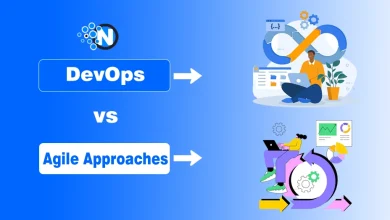Low-Code/No-Code VS Custom Software Solutions: What’s the Best for Your Project?

Businesses have a lot of options when it comes to software development. One popular option is low-code/no-code platforms, which allow you to create custom applications without any coding required. On the other hand, custom software is developed specifically for your business and can be more tailored to your needs.
So, which option is right for you?
Well, deciding between low-code/no-code and custom software development can be difficult. It’s essential to understand the differences between these two options and what each can offer your business.
In this blog post, I will explain both low-code/no-code & custom software and will also compare low-code/no-code vs custom software to help you decide which solution is best for your business!
Let’s begin!
What is Low-Code/No-Code Development?
Low-code/no-code development is the process of creating software, apps or websites with little or no programming. It eliminates the need of professional programming skills and expertise as low-code/no-code platforms are used for this purpose.
Low-code/no-code platforms are visual programming platforms that allow users to create custom applications without any coding required. These platforms provide a graphical interface and drag-and-drop functionality so that anyone can create an app without any coding experience.
These platforms come with a massive library of pre-built components that one can use to build an application. This means that you don’t have to start from scratch, saving a lot of time and effort. This makes them ideal for businesses that don’t have the resources to invest in a full-fledged development team. The future of low-code/no-code development is bright with the continuous advent of advanced AI tools and solutions.

Key Features of Low-Code/No-Code Development
Visual Interface
One of the key features of using a low-code or no-code platform is the visual interface. This makes it easy for non-technical users to create applications without writing any code. The drag-and-drop nature of most low-code platforms allows anyone to create an application, regardless of their technical skills.
Reusability
Another key feature of low-code/no-code platforms is reusability. This means that you can use pre-built components to create your applications, which can save you a lot of time and effort. You can also reuse components across different applications, reducing development time.
Robust Functionality
Despite the visual interface and ease of use, these platforms can be used to create robust, enterprise-grade applications. This is because most platforms offer a wide range of features and functionality which can be used to build complex applications.
Organizations choosing to build with these tools benefit from the same technical rigor and scalability they’d expect from a traditional software development company.
Cross-Platform Accessibility
Low-code/no-code platforms are designed to be accessible from anywhere. That means that you can use them to create applications that can be used on any device. This is a significant advantage over traditional development methods, which can be tied to a specific platform.
Advantages of Low-Code/No-Code Development
Saves Money & Resources
One of the biggest advantages of using a low-code/no-code platform is that it can save your business a lot of money. Since anyone can use these platforms to create custom applications, you won’t need to hire a dedicated development team.
In addition, low code no-code platforms come with a library of pre-built components that you can use to create your applications. This means that you don’t have to start from scratch, saving a lot of time and effort.
Faster Development Time
Furthermore, it can help you create custom applications in a fraction of the time it would take using traditional methods. This is because you don’t need to write any code, and you can reuse components across different applications. This means that you can get your applications up and running quickly.
Increased Productivity
Low-code/no-code platforms can also help increase productivity as they make it easy for non-technical users to create custom applications. Since anyone in your organization can create an application, you won’t need to rely on a dedicated development team.
This increased level of accessibility can lead to a significant increase in productivity, as more people can create custom applications.
Seamless Integration and Lifecycle Support
Low-code/no-code platforms are designed to easily integrate existing systems and processes. This means that you can quickly add custom applications to your existing infrastructure without any disruption.
In addition, most low-code/no-code platforms offer lifecycle support, which means that they will continue to work as your business grows and changes. This is a significant advantage over traditional development methods, which can become obsolete quickly.
Improved Agility
A low-code/no-code platform can help improve your business agility. This is because you can quickly deploy custom applications, which can help you promptly respond to changes in the market.
In addition, low-code/no-code platforms are designed to be easily integrated with existing systems. That means you can quickly add new applications to your infrastructure. This increased level of agility can help you gain a competitive advantage in the market.
Disadvantages of Low-Code/No-Code Development
Limited Functionality
One of the main disadvantages of low-code/no-code platforms is that they can be limited in terms of functionality. This is because most platforms only offer a limited set of features and functionality. This can be a problem for businesses that need to create complex applications.
In addition, low-code/no-code platforms can be challenging to customize to create the exact application you need.
Dependency on Platform
Another disadvantage of low-code/no-code app development is that it can create a dependency on the platform. This is because most businesses will need to use a specific platform to develop their applications.
This can be a problem if the platform is not well supported or if it goes out of business. In addition, it can be difficult to migrate applications from one low-code/no-code platform to another.
Security Limitations
Low-code/no-code platforms can also be limited in terms of security. This is because most platforms offer a limited set of security features. This can be a problem for businesses that need to create applications that handle sensitive data.
Business Logic Complications
Another disadvantage of low-code/no-code development is that it can be difficult to create business logic. This is because most platforms only offer a limited set of features and functionality, which can make it challenging to develop complex applications.
Vendor Lock-In
Another downside of using a low-code/no-code tools is vendor lock-in. This means that if you decide to switch to another platform, you will have to start from scratch. This is because most of your data will not be compatible with the new system.
5 Low-Code/No-Code Examples
What is Custom Software Development?
Custom software development is the process of designing, creating, deploying, and maintaining software applications for specific users, functions, or organizations. Unlike off-the-shelf software that is mass-produced and available to everyone, custom software is created specifically for a particular user or organization.
The development of bespoke software usually begins with an assessment of the requirements and business domain, followed by the development of software specifications. Once the specs are complete, the actual software development can begin. After the software is created, it must be deployed and maintained.

Advantages of Custom Software Development
Personalization
Personalization is one of the main advantages of custom software solutions development. It allows you to personalize your applications to meet the specific needs of your business. This means that you can add or remove features as needed, which can help you improve efficiency and productivity.
In addition, bespoke allows you to integrate your applications with your existing infrastructure, which can help you improve communication and collaboration.
Exclusive Ownership
Another advantage of bespoke software development is that you will have exclusive ownership of the software. This means you can customize the software to meet your specific needs without having to worry about licensing or other restrictions.
High Security and Reliability
Another advantage of custom software development is that it can offer high security and reliability. This is because custom software is designed specifically for your business, which means that it can be tailored to meet your specific security needs.
They can also be developed with built-in security features, which can help you protect your data from unauthorized access. Furthermore, bespoke software development can offer a higher level of reliability. This is because it can be tested and deployed in a controlled environment.
Continuous Support & Maintenance
When you use custom software development solutions, you will have access to continuous support and maintenance. This means that if there are any bugs or issues with the software, you can contact the development team to fix the problem.
In addition, most custom software development companies offer annual maintenance contracts that provide you with access to new features and updates. This can help you keep your software up-to-date and improve its overall performance.
Flexibility & Scalability
Custom software development is also flexible and scalable. This means that you can easily add or remove features as your business needs change. In addition, bespoke software can be designed to grow your business, which means that you won’t have to replace it as your company grows.
Disadvantages of Custom Software Development
More Expensive
One of the main disadvantages of custom software development providers is that it can be expensive. This is because you will have to pay for the development team’s time, which can be costly. In addition, you may also have to pay for licensing fees and other costs associated with the development process.
Time Consuming
Custom software development outsourcing can be time-consuming. This is because the development process can take several months. In addition, you may also have to wait for the software to be deployed and tested before it is ready for use.
Risk of Failure
There is also a risk of failure in custom software development. This is because the development process can be complex with different technologies. Also, there is always a chance that something could go wrong. This could lead to the software not being used or having to be completely rewritten.
When to Use Low-Code/No-Code Development?
Low code no-code development is a good option when you need to create simple applications quickly. They can be completed in a shorter time and can be less expensive than custom software development.
In addition, low-code/no-code development is a good option when you don’t have the resources or expertise to develop a custom solution. These developments can be completed using drag-and-drop tools, making it easy to create an application without writing code.
When to Use Custom Software Development?
Custom software development is a good option when you need a customized or complex solution. This type of development can take longer and be more expensive. However, it will offer you a solution that is tailored to your specific needs and has the potential to grow.
In addition, custom software development is a good option when you need a high level of security and reliability. This type of development can be designed with built-in security features. This can help you protect your data from unauthorized access.
Finally, custom software development is a good option when you need continuous support and maintenance. This type of development can be supported by an annual maintenance contract. So, you will always have access to new features and updates.
Experienced technology consultants might guide you on what solution is most suited to your needs. Consider talking with some before making this critical decision.
Which Option Is Right for You?
Low-code/no-code development and custom software development are both valid options that offer different benefits. The best option for you will depend on your specific needs and requirements. If you need a quick and simple solution, low-code/no-code development may be the best option for you. Custom software development may be the best option if you need a highly customized and complex solution.




